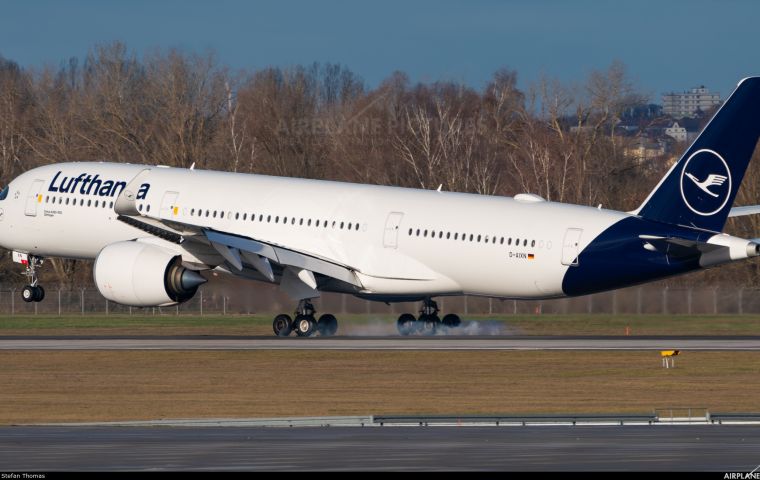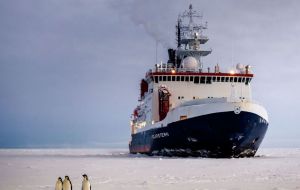MercoPress. South Atlantic News Agency
Lufthansa to fly nontop to Falklands carrying German scientists
 The Airbus 350 registered D-AIXN is to transport researchers from the Alfred Wegener Institute to the Islands on their way to Antarctica.
The Airbus 350 registered D-AIXN is to transport researchers from the Alfred Wegener Institute to the Islands on their way to Antarctica.  From the Falkland Islands, the researchers will travel to Antarctica on the German research ship Polarstern
From the Falkland Islands, the researchers will travel to Antarctica on the German research ship Polarstern German carrier Lufthansa Wednesday issued a press release confirming plans are underway for a nonstop charter flight between Hamburg and Mount Pleasant in the Falkland Islands for scientific purposes. The airline highlighted the trip will be one of its longest nonstop stretches ever.
The two-year-old twin-engined Airbus 350-900 registered D-AIXN is to transport researchers from the Alfred Wegener Institute to the Islands on their way to Antarctica. From the Falkland Islands, the researchers will travel to Antarctica on the German research ship RV Polarstern to spend the next polar winter at Station “Neumayer III”, which can only be reached by small aircraft with a special landing gear suitable for harsh weather.
Summer is typically when personnel stationed in the bases takes place fly back home and are replaced by new crews. Normally, stopovers were arranged to take place in South Africa, but the route was rendered unusable due to covid-19 restrictions. In any case, the idea is to prevent the virus from reaching the polar station at all costs. That is why the 18 crew members (four pilots, four technicians, and 18 flight attendants) together with the investigators are already in quarantine in Hamburg.
It is expected that the duration of the flight will be of around 15 hours. The flight plan is set to include Punta Arenas in Chile as the alternative airport.
The flight is set to depart Hamburg on February 1 as LH2574 at 7 AM carrying 92 passengers in a 293 seat configuration. Half of them are scientists from the Alfred Wegener Institute and the other half the ship's crew for the next expedition with the Polarstern research vessel. The aircraft is due in Munich on February 3 as LH2575 at around 2 PM with the RV Polarstern crew that had departed Bremerhaven on December 20 onboard.
The Lufthansa crew and technicians (17 people in total) are in quarantine in Hamburg and will remain in quarantine upon arrival in the Falkland Islands. Despite the restrictions, they reported that more than 600 employees volunteered for this trip.
The Alfred Wegener Institute will offset CO2 emissions from flights through the non-profit climate protection organization Atmosfair, which is also the case for this particular flight. The institute donates funds to biogas plants in Nepal for every mile traveled, thereby reducing the same amount of CO2 emissions.
Lufthansa also stressed that the preparations for this flight “are immense” and include additional training for the pilots and the handling of fuel available at the Mount Pleasant military base for the return. All cargo and luggage on the plane will be loaded into Hamburg fully disinfected and sealed, and there are also additional containers for waste on board, since they can only be disposed of when returning to Germany, all to prevent any type of transmission of COVID-19.
“We are pleased to be able to support a polar research expedition during these difficult times. Commitment to climate research is very important to us. We have been active in this field for more than 25 years and have equipped selected aircraft with measuring instruments, which are then used by scientists around the world to make climate models more accurate and improve weather forecasts, ”Mission Chief Thomas Jahn was quoted as saying.
Dr. Hartmut Hellmer, AWI's physical oceanographer and scientific leader of the upcoming RV Polarstern expedition pointed out thet “we have been meticulously preparing for this expedition, which we have been planning for years and are now able to embark despite the pandemic. For decades, we have been collecting fundamental data on ocean currents, sea ice, and the carbon cycle in the southern ocean. As these long-term measurements form the basis for our understanding of polar processes and urgently needed climate predictions, it is important that research in Antarctica continue through these difficult times. We cannot allow large data gaps in climate research.”




Top Comments
Disclaimer & comment rulesCommenting for this story is now closed.
If you have a Facebook account, become a fan and comment on our Facebook Page!